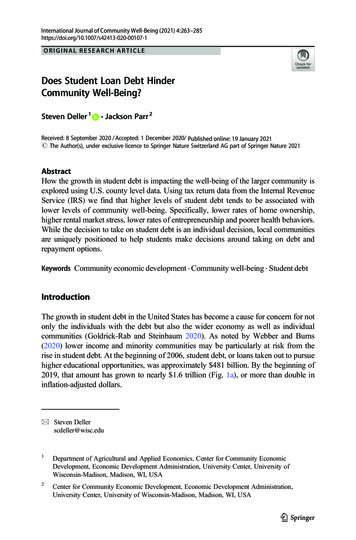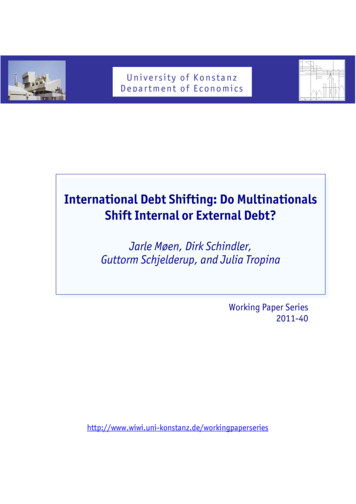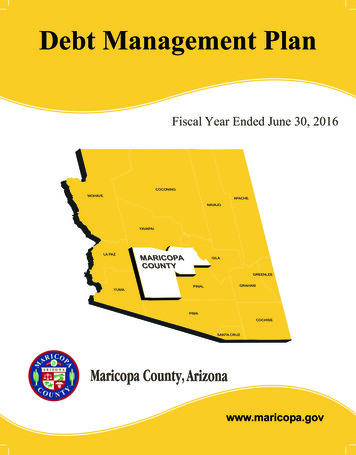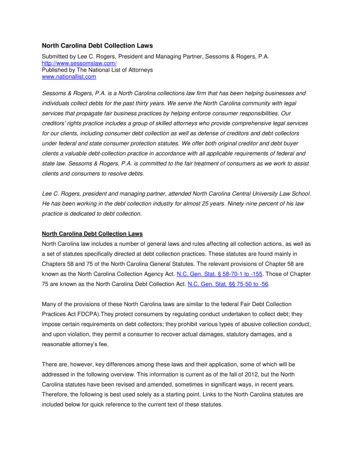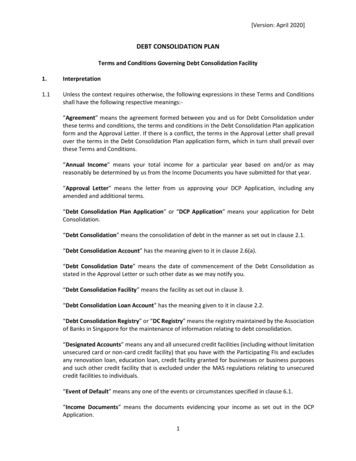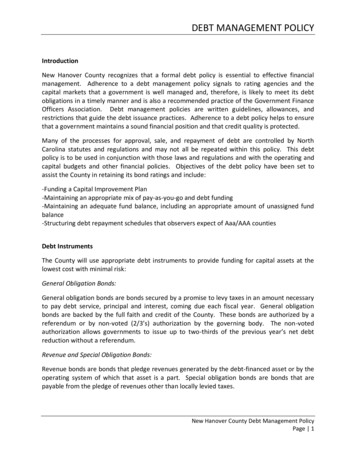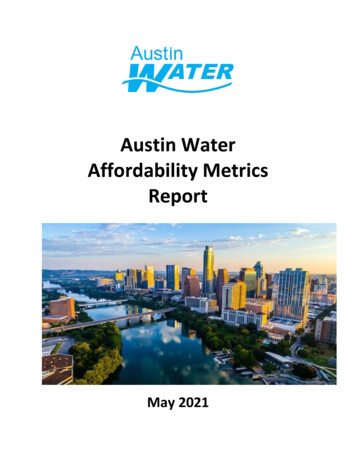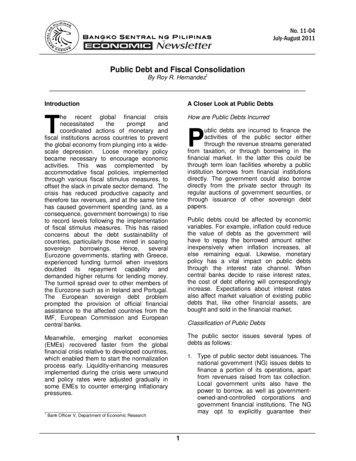
Transcription
Draft Regulations laid before Parliament and Senedd Cymru under section 7(8)(a) and (b) of theFinancial Guidance and Claims Act 2018, for approval by resolution of each House of Parliamentand Senedd Cymru.DRAFT STATUTORY INSTRUMENTS2022 No. ****DEBT MANAGEMENT AND RELIEF, ENGLAND ANDWALESThe Debt Respite Scheme (Statutory Debt Repayment Plan etc.)(England and Wales) Regulations 2022Made----***2022Coming into force in accordance with regulation 1(2) to (7)CONTENTSPART 1General Provisions1.2.3.4.5.6.7.8.9.10.11.12.13.Citation, commencement, extent and applicationInterpretationFurther interpretationMeaning of debt advice providerDebt advice provider fees and referralsMeaning of qualifying debtMeaning of priority debtMeaning of mandatory non-eligible debtMeaning of discretionary non-eligible debtMeaning of plan debtMeaning of creditor by assignmentMeaning of payment distributorMeaning of threshold for creditor objection458891010101313131414PART 2PlansCHAPTER 1Making, withdrawing and cancelling plan applications14.15.16.Application for a planWithdrawal of application by debtorCancellation of application by debt advice provider141515
CHAPTER 2Consideration of applications, intention to initiate a plan17.18.19.20.21.Obligations of debt advice provider when considering an applicationRequirements in relation to an application for a planNotice of intention to initiate a planCreditor – obligations on receipt of a notice of intention to initiate a planObligations on a debt advice provider – creditor’s response to intention to initiate aplan1616171819CHAPTER 3Devising the provisional plan22.23.Provisional planNotice of provisional plan2021CHAPTER 4Effect of provisional plan or final plan24.25.26.27.28.29.30.31.Obligations on debtor from date of provisional planEffect of a plan on enforcement actionEffect of payments under a planError in debt value – effect on provisional planCreditor objection to provisional plan – grounds and procedureCreditor objection to provisional plan – effectProvisional plan – outcome of fair and reasonable assessmentRequirements of fair and reasonable assessment not met - debt advice provider reconsideration2223252626272728CHAPTER 5Final plans – amending debt values, reviews, variations and payment .47.48.49.50.51.52.Error in debt value – effect on final planAnnual reviewIn-year review – generalIn-year review – creditor applicationVariation of a plan – generalProposed variation of a plan – submission to Secretary of StateCreditor objection to proposed variation – grounds and procedureCreditor objection to proposed variation – effectCreditor objection to proposed variation – outcome of fair and reasonableassessmentApplication for a payment breakRevocation of a plan – debtor applicationRevocation of a plan – mandatory groundsRevocation of a plan – discretionary groundsRevocation of a plan – procedure mandatory groundsRevocation of a plan – procedure discretionary groundsCompliance with a conditional noticeEffect of revocationRefusal of debtor application for revocationRevocation of a plan – extension of limitation periodsRevocation of a plan – extension of other deadlinesCompletion of a plan2282929303032323333343535363637373839393940
PART 3Payment Distributors53.54.55.56.57.58.List of payment distributorsAppointment of a payment distributorFunctions of a payment distributorFundingPayment distributors – ceasing to actMethods of payment404041424243PART 4Reviews and AppealsCHAPTER 1Fair and Reasonable Assessment59.60.61.Fair and reasonable assessmentFair and reasonable assessment – review of assessment outcomeFair and reasonable assessment – exercise of Secretary of State functions444546CHAPTER 2Reviews of debt advice provider decisions62.63.Application for review of a debt advice provider decisionReview of debt advice provider decision – application to court4647PART 5Administration64.65.66.67.68.Electronic system maintained by the Secretary of StateAccess to information held on the electronic systemInformation on plan registerNotifications provided to and by the Secretary of StateElectronic system malfunction4848494950PART 6Miscellaneous69.70.71.72.73.74.Non-disclosure of a debtor’s usual residential addressDeath of debtor during plan periodSelling or transferring debtsDisclosure of informationContact between a creditor or agent and debtor during a planExisting legal proceedings at the start of a plan505151515252PART 7Amendment of the Breathing Space Regulations75.Amendment of the Breathing Space RegulationsPART 8Supplemental354
76.Review of regulatory provision55The Treasury(a)in exercise of the powers conferred by section 7(2), (4A) and (5)(a) and (ba) to (d)of the Financial Guidance and Claims Act 2018(b)make the following Regulations.In accordance with section 7(8)(a) of that Act, a draft of this instrument has been laid before andapproved by a resolution of each House of Parliament.In accordance with section 7(8)(b) of that Act, a draft of this instrument has been laid before andapproved by a resolution of Senedd Cymru.In accordance with section 7(2) and (3) of that Act, the Treasury have received advice from thesingle financial guidance body(c)on the establishment of a debt respite scheme and have taken thatadvice into account in making these Regulations.PART 1General ProvisionsCitation, commencement, extent and application1.—(1) These Regulations may be cited as the Debt Respite Scheme (Statutory Debt RepaymentPlan etc.) (England and Wales) Regulations 2022.(2) This regulation and regulation 75 come into force at the end of the period of 90 daysbeginning with the day on which these Regulations are made.(3) With the exception of the provisions referred to in paragraphs (4) to (7) the remainder ofthese Regulations come into force on the relevant date.(4) Sub-paragraph (b) of the definition of “lease” and the definition of “occupation contract” inregulation 2(1) come into force on whichever date is the later of—(a) the relevant date;(b) the day that section 7 of the 2016 Act comes into force.(5) Regulation 25(6)(l)(i) comes into force on whichever date is the later of—(a) the relevant date;(b) the day that section 157 of the 2016 Act comes into force.(6) Regulation 25(6)(l)(ii) comes into force on whichever date is the later of—(a) the relevant date;(b) the day that section 181 of 2016 Act comes into force.(7) Regulation 25(6)(l)(iii) comes into force on whichever date is the later of—(a) the relevant date;(b) the day that section 187 of 2016 Act comes into force.(8) These Regulations extend to England and Wales.(a) In accordance with section 26(2) of the Financial Claims and Guidance Act 2018, the reference to the Secretary of State insection 7(2) of that Act is to be read as a reference to the Secretary of State or the Treasury.(b) 2018 c. 10. Section 7(4A) and (5)(ba) were inserted by section 34 of the Financial Services Act 2021 (c. 22).(c) The single financial guidance body is named the Money and Pensions Service under regulation 2 of the Financial Guidanceand Claims Act 2018 (Naming and Consequential Amendments) Regulations 2019 (S.I. 2019/383).4
(9) These Regulations apply in respect of debtors domiciled in England and Wales or ordinarilyresident in England or Wales.(10) In this regulation—“the 2016 Act” means the Renting Homes (Wales) Act 2016(a);“the relevant date” means [**** 2024].Interpretation2. In these Regulations—“agent” includes—(a) an enforcement agent,(b) a public authority,(c) a solicitor, or(d) a person appointed to collect a plan debt on behalf of a creditor;“arrears” means any sum other than capitalised mortgage arrears payable to a creditor by adebtor which has fallen due and which the debtor has not paid at the date of an application fora plan in breach of the agreement between the creditor and debtor or in breach of thelegislation or rules under which the debtor incurred the debt or liability;“bankruptcy petition” means a petition for a bankruptcy order under Chapter 1 of Part 9 of theInsolvency Act 1986(b);“Breathing Space Regulations” means the Debt Respite Scheme (Breathing Space Moratoriumand Mental Health Crisis Moratorium) (England and Wales) Regulations 2020(c);“business day” means any day other than—(a) Saturday or Sunday,(b) Christmas Day or Good Friday, or(c) a day which is a bank holiday under the Banking and Financial Dealings Act 1971(d) inEngland and Wales;“capitalised mortgage arrears” means any arrears in relation to a mortgage that have beenadded to the outstanding balance to be paid over the duration of the mortgage;“conditional notice” is to be construed in accordance with regulation 46;“conditional sale agreement” means an agreement for the sale of goods under which thepurchase price or part of it is payable by instalments, and the property in the goods is toremain in the seller (notwithstanding that the buyer is to be in possession of the goods) untilsuch conditions as to the payment of instalments or otherwise as may be specified in theagreement are fulfilled;“contingent debt” is to be construed in accordance with regulation 6(2)(c)(ii);“controlled goods agreement” means an agreement under paragraph 13(4) of Schedule 12 tothe Tribunals, Courts and Enforcement Act 2007;“creditor by assignment” is to be construed in accordance with regulation 11;“debt advice provider” has the meaning given in regulation 4;“debt relief order” means an order under Part 7A of the Insolvency Act 1986(e);(a)(b)(c)(d)(e)2016 anaw 1. Section 7 is not yet in force.1986 c.45.S.I. 2020/1311.1971 c. 80.Part 7A was inserted by the Tribunals, Court and Enforcement Act 2007 (c. 15), Schedule 17, paragraph 1.5
“debt solution” means an arrangement, scheme or procedure, whether statutory or not, the aimof which is to pay, discharge or liquidate some or all of a debtor’s debts;“debtor” in relation to a plan means the individual who applied for it;“discretionary non-eligible debt” is to be construed in accordance with regulation 9;“enforcement action” is to be construed in accordance with regulation 25(8);“enforcement agent” means—(a) an individual authorised by section 63(2) of the Tribunals, Courts and Enforcement Act2007(a) to act as an enforcement agent, or(b) an individual authorised in accordance with paragraph 2(1) of Schedule 7 to the CourtsAct 2003(b) to act as an enforcement officer;“fair and reasonable assessment” is to be construed in accordance with regulation 59;“final plan” is to be construed in accordance with regulations 29 and 30;“final warning notice” means a notice issued by the Secretary of State that sets out that theplan is to be revoked on a date specified in the notice if the conditions specified in the noticehave not been met by the debtor (or in the case of joint debtors, by both of them);“FSMA” means the Financial Services and Markets Act 2000(c);“future debt” is to be construed in accordance with regulation 6(2)(c)(i);“hire-purchase agreement” means an agreement, other than a conditional sale agreement,under which—(a) goods are bailed or (in Scotland) hired in return for periodical payments by the person towhom they are bailed or hired, and(b) the property in the goods will pass to that person if the terms of the agreement arecomplied with and one or more of the following occurs—(i) the exercise of an option to purchase by that person;(ii) the doing of any other specified act by any party to the agreement;(iii) the happening of any other specified event;“income payments agreement” means an income payments agreement within the meaning ofsection 310A of the Insolvency Act 1986(d);“income payments order” means an income payments order within the meaning of section 310of the Insolvency Act 1986(e);“individual voluntary arrangement” means a voluntary arrangement under Part 8 of theInsolvency Act 1986;“interest” means any interest charged by a creditor in relation to a plan debt;“interim order” means an interim order under section 252(1) of the Insolvency Act 1986(f);“joint debt” has the meaning given in regulation 14(2);“joint debtor” has the meaning given in regulation 14(2);“joint plan” has the meaning given in regulation 14(2);“lease” means—(a) a lease, under-lease or other tenancy, assignment operating as a lease or under-lease, or anagreement for such lease, under-lease tenancy, or assignment, or(a)(b)(c)(d)(e)(f)2007 c. 15. Section 63 was amended by section 170 of the Tax Collection and Management (Wales) Act 2016 (anaw 6).2003 c. 39.2000 c. 8.Section 310A was inserted by section 260 of the Enterprise Act 2002 (c. 40).Section 310 was amended by Schedule 3 to the Pensions Act 1995 (c. 26), Schedule 2 to the Welfare Reform and PensionsAct 1999(c. 30), section 259 of, and Schedule 2 to, the Enterprise Act 2002 and S.I. 2011/1730 as itself amended by S.I.2012/709.Section 252 was amended by Schedule 3, paragraphs 1 and 2 of the Insolvency Act 2000 (c. 39).6
(b) an occupation contract;“limitation time limit” means any time limit applicable, whether under the Limitation Act1980(a) or any other enactment, to the bringing of an action.“local authority” means—(a) in relation to England, a county council, a London borough council, a district council, theCommon Council of the City of London, or the Council of the Isles of Scilly;(b) in relation to Wales, a county council, a county borough council or a community council;“mandatory non-eligible debt” has the meaning given in regulation 8;“notice of intention to initiate a plan” is to be construed in accordance with regulation 19;“occupation contract” has the meaning given in section 7 of the Renting Homes (Wales) Act2016;“ongoing liability” means any payment, other than in respect of arrears, which is due inrelation to—(a) a secured credit agreement where the obligation of the debtor (or in the case of jointdebtors, of either of them), to repay is secured by a mortgage on land used by the debtor(or in the case of joint debtors, either of them) as their primary residence,(b) a lease in relation to a property used by a debtor (or in the case of joint debtors, either ofthem) as their sole or primary residence,(c) an insurance agreement,(d) taxes, duties and national insurance contributions,(e) local taxes to fund local authority expenditure and rates,(f) the supply of water, sewerage, electricity, gas, heating oil or solid fuel, or(g) the supply of internet services or mobile phone network;“Part 4A permission” has the meaning given in section 55A(5) of FSMA(b);“payment distributor” has the meaning given in regulation 12;“plan” means a statutory debt repayment plan, established in accordance with theseRegulations, for the repayment of qualifying debt owed by a debtor to one or more creditorsthat provides for the repayment of that debt over a period specified in the plan which, subjectto regulations 36 and 41, must not exceed 10 years;“plan debt” is to be construed in accordance with regulation 9;“plan period” means the period beginning with the day after the day on which the Secretary ofState sends the creditor a provisional plan under regulation 23, and ending—(a) on the day on which the provisional plan is cancelled, or(b) if the provisional plan takes effect as a final plan, on the day on which the final plan isrevoked or completed (as the case may be);“plan register” means the register maintained by the Secretary of State under regulation 64;“priority debt” is to be construed in accordance with regulation 7;“provisional plan” is to be construed in accordance with regulation 22;“qualifying debt” is to be construed in accordance with regulation 6;“representative” means—(a) a person who has been granted—(a) 1980 c. 58.(b) Part 4A of the Financial Services and Markets Act 2000 was substituted for sections 40 to 55 of that Act by section 11 ofthe Financial Services Act 2021 (c. 21). There are amendments to section 55A but none are relevant here.7
(i) an enduring power of attorney in accordance with such of the regulations mentioned inparagraph 2 of Schedule 4 to the Mental Capacity Act 2005(a) as applied when theenduring power of attorney was executed, or(ii) a lasting power of attorney in respect of the debtor’s property and affairs in accordancewith section 9(1)(b) of the Mental Capacity Act 2005,(b) a deputy appointed by the court in respect of the debtor’s property and affairs inaccordance with section 16(2)(b) of the Mental Capacity Act 2005, or(c) a person appointed as a guardian under the Guardianship (Missing Persons) Act 2017(b);“schedule of payments” is to be construed in accordance with regulation 22;“secured credit agreement” means an agreement under which one person provides credit toanother and which provides for the obligation to repay to be secured—(a) by a mortgage on land,(b) on assets whose value at least equals the amount of debt, or(c) on a letter of credit or guarantee;“secured debt” means debt incurred under—(a) a secured credit agreement,(b) a hire-purchase agreement, or(c) a conditional sale agreement;“Standard Financial Statement” means the tool, made available to certain memberorganisations by the Money and Pensions Service under that title, which provides a universalincome and expenditure statement, together with a single set of spending guidelines andguidance and other materials which may be used for the purposes of assisting a debtor to finda debt solution;“threshold for creditor objection” has the meaning given in regulation 13;“universal credit” means universal credit under Part 1 of the Welfare Reform Act 2012(c).Further interpretation3. In these Regulations—(a) any reference to a debtor includes the debtor’s representative,(b) any reference to a plan is to be construed as a reference to either of a provisional plan or afinal plan,(c) unless otherwise provided, for the purposes of joint plans—(i) any reference to a plan includes a joint plan,(ii) any reference to a debtor includes a joint debtor,(iii) any reference to the debtor is to be construed as a reference to each of the joint debtors,and(d) a plan is “in force” until the day on which it is cancelled, revoked or completed (as thecase may be).Meaning of debt advice provider4. —(1) In these Regulations a “debt advice provider” means—(a) an authorised person who has a Part 4A permission relating to regulated activities fallingwithin both—(a) 2005 c. 9. There are amendments to parerga 2 of Schedule 4 but none are relevant here.(b) 2007 c. 27.(c) 2012 c. 5.8
(i) article 39D (debt adjusting), and(ii) article 39E (debt-counselling)of the Financial Services and Markets Act 2000 (Regulated Activities) Order 2001(a), or(b) a local authority carrying on regulated activities falling within both articles 39D and 39Eof that Order.(2) In this regulation—(a) “authorised person” means a person who is authorised for the purposes of FSMA;(b) “regulated activity” is to be construed in accordance with section 22 of FSMA.Debt advice provider fees and referrals5. —(1) A debt advice provider must not charge a debtor a fee in connection with a plan.(2) Paragraph (1) does not prevent payment to the debt advice provider under regulation56(2)(a).(3) A debt advice provider must refer a debtor to another debt advice provider if thecircumstances specified in paragraphs (4) to (7) apply.(4) A debt advice provider may refer a debtor to another debt advice provider in any othercircumstances if they consider it is appropriate to do so.(5) The circumstances specified in this paragraph are that—(a) the Secretary of State has sent a notice of intention to initiate a plan under regulation19(2),(b)the debtor (or in the case of joint debtors, either of them) has notified the debt adviceprovider that the debtor is intending to make a request to the debt advice provider to bereferred to another debt advice provider,(c) the debt advice provider and debtor have discussed the debtor’s intention, and(d) the debtor then makes the request to be referred to another debt advice provider.(6) The circumstances specified in this paragraph are that the debt advice provider has applied tothe Financial Conduct Authority to cancel or vary the Part 4A permission referred to in regulation4(1)(a).(7) The circumstances specified in this paragraph are that the debt advice provider has receiveda decision notice from the Financial Conduct Authority in accordance with section 55Z of FSMA(cancellation of Part 4A permission: procedure) in respect of the Part 4A permission referred to inregulation 4(1)(a) and does not intend to refer the matter to the Tribunal under that section.(8) The circumstances specified in this paragraph are that the debt advice provider has receiveda decision notice from the Financial Conduct Authority in respect of the Part 4A permissionreferred to in regulation 4(1)(a) in accordance with section 55Z of FSMA and has referred thematter under section 55Z of FSMA and—(a) the Tribunal upheld the decision notice, and(b) the debt advice provider is no longer entitled to refer or otherwise appeal that decisionnotice (ignoring any possibility of an appeal out of time with permission).(9) Where a debt advice provider accepts a referral of a debtor at any time after a notice ofintention to initiate a plan has been sent by the Secretary of State under regulation 19(2), theymust, by the end of the business day following that acceptance, provide a notification that theyhave accepted the referral to —(a) the Secretary of State, and(b) the debtor.(a) S.I. 2001/544. Articles 39 D and 39E were inserted by S.I. 2013/1881, article 5.9
(10) Where the Secretary of State receives a notification from a debt advice provider inaccordance with paragraph (8)(a), the Secretary of State must, by the end of the following businessday, send a notification of the referral to—(a) each creditor or, if the agent’s contact details have been provided to the Secretary of Stateinstead of the creditor’s under regulation 14, the agent, and(b) the payment distributor for the plan.(11) A referral of a debtor to a debt advice provider takes effect in relation to the obligations ofthe debt advice provider under these Regulations on the business day following the day on whichthe debt advice provider accepts the referral.(12) Unless otherwise provided, in this regulation references to “debtor” in relation to a jointplan are to be construed as references to both joint debtors.Meaning of qualifying debt6. —(1) In these Regulations a “qualifying debt” means, in relation to a provisional plan, a finalplan or an application for a plan, any debt or liability that was owed by the debtor at the time whenthe application for the plan was made, other than—(a) a mandatory non-eligible debt within the meaning of regulation 8, or(b) a discretionary non-eligible debt within the meaning of regulation 9.(2) A qualifying debt includes—(a) any amount which a debtor is liable to pay under or in relation to—(i) an order or warrant for possession of the debtor’s place of residence or business,(ii) a court judgment, or(iii) a controlled goods agreement;(b) any debt owed or liability payable to the Crown;(c) any debt or liability other than an ongoing liability which, at the date of the applicationfor a plan, was—(i) known and quantifiable but not yet due for payment (“future debt”), or(ii) known but not yet quantifiable or due for payment (“contingent debt”).(3) A debt can be a qualifying debt for the purpose of these Regulations whether or not it isentered into, or due to be paid or repaid, before these Regulations come into force.Meaning of priority debt7.—(1) In these Regulations, “priority debt” means debt of the type specified in paragraph (2),to which payments under a plan must be allocated in accordance with regulation 64(2)(b).(2) The type of debt specified in this paragraph is qualifying debt—(a) in relation to the letting to the debtor (or in the case of joint debtors, either of them) of adwelling house in which the debtor resides as their sole or primary residence,(b) in relation to a mortgage agreement in relation to a dwelling house in which the debtor (orin the case of joint debtors, either of them) resides as their sole or primary residence,(c) owed by the debtor (or in the case of joint debtors, either of them) to a local authority orto the Crown,(d) in relation to the supply of gas or electricity,(e) in relation to a hire-purchase agreement, and(f) in relation to an agreement with an internet service provider or mobile phone network.Meaning of mandatory non-eligible debt8.—(1) In these Regulations “mandatory non-eligible debt” means—10
(a) secured debt which does not amount to arrears in respect of secured debt;(b) non-eligible business debt;(c) additional credit obtained in accordance with regulation 24(1)(d) and 24(2) to (4);(d) any debt which the debtor (or in the case of joint debtors, either of them) incurred bymeans of any fraud or fraudulent breach of trust by the debtor;(e) any liability in respect of a fine imposed by a court for an offence or from any liabilityunder a recognisance;(f) any liability in respect of—(i) an income payments agreement, or(ii) an income payments order;(g) any obligation arising under a confiscation order made under—(i) section 1 of the Drug Trafficking Offences Act 1986(a) or that Act as it continues inforce by virtue of any savings made in connection with its repeal by the DrugTrafficking Act 1994(b),(ii) section 2 of the Drug Trafficking Act 1994(c) or that Act as it continues in force byvirtue of any savings made in connection with its repeal by the Proceeds of Crime Act2002(d),(iii) section 1 of the Criminal Justice (Scotland) Act 1987(e) or that Act as it continues inforce by virtue of any savings made in connection with its repeal by the CriminalProcedure (Consequential Provisions) (Scotland) Act 1995(f),(iv) section 71 of the Criminal Justice Act 1988(g) or that Act as it continues in force byvirtue of any savings made in connection with its repeal by the Proceeds of Crime Act2002, or(v) Parts 2, 3 or 4 of the Proceeds of Crime Act 2002;(h) any obligation (including an obligation to pay a lump sum or to pay costs) arising underan order made in family proceedings or any obligation arising under a maintenanceassessment or maintenance calculation made under the Child Support Act 1991(h);(i) any obligation arising from a payment out of the social fund by way of crisis loan orbudgeting loan under section 138(1)(b) of the Social Security Contributions and BenefitsAct 1992(i) or that Act as it continues in force by virtue of any savings made inconnection with its repeal by the Welfare Reform Act 2012(j);(j) any debt or liability to which a debtor is or may become subject in respect of any sumpaid or payable to the debtor as a student loan and which the debtor receives whetherbefore or after the plan starts;(k) any debt which consists of a liability to pay damages for negligence, nuisance or breachof a statutory, contractual or other duty, or to pay damages by virtue of Part 1 of theConsumer Protection Act 1987(k), being in either case damages in respect of the death of(a) 1986 c. 32. Section 1 was repealed by the Drug Trafficking Act 1994 (c. 37), Schedule 3, paragraph 1 but saved by the DrugTrafficking Act 1994 (c. 37), Schedule 2, paragraph 2.(b) 1994 c. 37.(c) Section 2 was repealed by the Proceeds of Crime Act 2002 (c. 29), Schedule 12, paragraph 1 but saved by S.I. 2003/333,articles 10(1)(e) and 13(b).(d) 2002 c. 29.(e) 1987 c. 41. Section 1 was repealed by the Criminal Procedure (Consequential Provisions) (Scotland) Act 1995 (c. 40),Schedule 5, paragraph 1 but saved by Schedule 3 to that Act.(f) 1995 c. 40.(g) 1988 c. 33. Section 71 was repealed by the Proceeds of Crime Act 2002 (c. 29), Schedule 12, paragraph 1 but saved by S.I.2003/333, articles 10(1)(a) and 13(a).(h) 1991 c. 48. “maintenance calculation” was substituted for “maintenance assessment” by section 1(2) of the Child Support,Pensions and Social Security Act 2000 (c. 19) in relation to certain cases in accordance with S.I. 2003/192.(i) 1992 c. 4.(j) 2012 c. 5.(k) 1987 c. 43.11
or personal injury (including any disease or other impairment of physical or mentalcondition) to any person;(l) a payment on account of universal credit under regulations 4 or 11 of the Social Security(Payments on Account of Benefit) Regulations 2013(a);(m) any liability in respect of council tax for a financial year, except where—(i) all the instalments for that year have fallen due and any of those instalments has notbeen paid, or(ii) a reminder notice has been served on the debtor under regulation 23(1) of the CouncilTax (Administration and Enforcement) Regulations 1992(b);(n) any liability in respect of non-domestic rates for a financial year, except where—(i) all the instalments for that year have fallen due and any of those instalments has notbeen paid, or(ii) a further notice has been served on the debtor under regulation 8(1) of the NonDomestic Rating (Collection and Enforcement) (Local Lists) Regulations 1989(c).(2) The debt referred to in paragraph (1)(e) includes any amounts owed by a debtor as a result ofsupplies taken illegally of gas under paragraph 9 of Schedule 2B to the Gas Act 1986(d) orelectricity under paragraph 4 of Schedule 6 to the Electricity Act 1989(e).(3) In this regulation—(a) “family proceedings” means—(i) proceedings in the family court, and(ii) family proceedings within the meaning of Part V of the Matrimonial and FamilyProceedings Act 1984(f);(b) “fine” includes—(i) any pecuniary penalty or pecuniary forfeiture or pecuniary compensation payableunder a conviction, and(ii) in relation to a fine imposed for an offence, a reference to a charge ordered to be paidunder section 21A of the Prosecution of Offences Act 1985(g) (criminal courtscharge), whether on conviction or otherwise,and includes any interest on the fine and any penalties or charges incurred in connectionwith it;(c) “non-eligible business debt” means debt incurred in conne
Reviews of debt advice provider decisions 62. Application for review of a debt advice provider decision 46 63. Review of debt advice provider decision - application to court 47 . "debt relief order" means an order under Part 7A of the Insolvency Act 1986(e); (a) 2016 anaw 1. Section 7 is not yet in force. (b) 1986 c.45.
